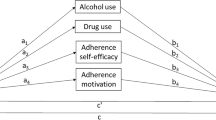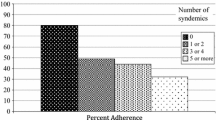Abstract
Background
Psychotropic medications are commonly used for depressive symptoms among people living with HIV/AIDS.
Purpose
We examined the relationships between adherence to psychotropic medications, depressive symptoms, and antiretroviral adherence.
Methods
We assessed depressive symptoms among 324 people living with HIV/AIDS across a 3-month period (70% men; mean age 45 years; 90% African–American). Psychotropic and antiretroviral adherence was assessed using monthly, unannounced telephone pill counts. Multiple-regression and mediation analyses were utilized to examine associations under investigation.
Results
Greater depressive symptoms were associated with lower antiretroviral and psychotropic medication adherence. Greater adherence to psychotropic medications regardless of medication class was positively related to higher antiretroviral adherence. Greater adherence to psychotropic medications also significantly mediated the association between depressive symptoms and antiretroviral adherence.
Conclusions
This study demonstrates the benefits of adherence to psychotropic medications on both depressive symptoms and antiretroviral adherence. Future work examining psychotropic medication adherence on disease outcomes in people living with HIV/AIDS is warranted.

Similar content being viewed by others
References
Detels R, Muñoz A, McFarlane G, et al. Effectiveness of potent antiretroviral therapy on time to AIDS and death in men with known HIV infection duration. Multicenter AIDS Cohort Study Investigators. JAMA. 1998; 280: 1497–1503.
Egger M, May M, Chêne G, et al. Prognosis of HIV-1-infected patients starting highly active antiretroviral therapy: A collaborative analysis of prospective studies. Lancet. 2002; 360: 119–129.
Hammer SM, Squires KE, Hughes MD, et al. A controlled trial of two nucleoside analogues plus indinavir in persons with human immunodeficiency virus infection and CD4 cell counts of 200 per cubic millimeter or less. AIDS Clinical Trials Group 320 Study Team. N Engl J Med. 1997; 337: 725–733.
Hogg RS, Yip B, Chan KJ, et al. Rates of disease progression by baseline CD4 cell count and viral load after initiating triple-drug therapy. JAMA. 2001; 286: 2568–2577.
Murphy EL, Collier AC, Kalish LA, et al. Viral Activation Transfusion Study Investigators. Highly active antiretroviral therapy decreases mortality and morbidity in patients with advanced HIV disease. Ann Intern Med. 2001; 135: 17–26.
Vlahov D, Galai N, Safaeian M, et al. Effectiveness of highly active antiretroviral therapy among injection drug users with late-stage human immunodeficiency virus infection. Am J Epidemiol. 2005; 161: 999–1012.
Bangsberg DR. Less than 95% adherence to nonnucleoside reverse-transcriptase inhibitor therapy can lead to viral suppression. Clin Infect Dis. 2006; 43: 939–941.
Parienti JJ, Ragland K, Lucht F, et al. Average adherence to boosted protease inhibitor therapy, rather than the pattern of missed doses, as a predictor of HIV RNA replication. Clin Infect Dis. 2010; 50: 1192–1197.
Rosenblum M, Deeks SG, van der Laan M, Bangsberg DR. The risk of virologic failure decreases with duration of HIV suppression, at greater than 50% adherence to antiretroviral therapy. PLoS One. 2009; 4: e7196.
Arnsten JH, Li X, Mizuno Y, et al. Factors associated with antiretroviral therapy adherence and medication errors among HIV-infected injection drug users. J Acquir Immune Defic Syndr. 2007; 46: S64-71.
Glass TR, Battegay M, Cavassini M, et al. Longitudinal analysis of patterns and predictors of changes in self-reported adherence to antiretroviral therapy: Swiss HIV Cohort Study. J Acquir Immune Defic Syndr. 2010; 54: 197–203.
Springer SA, Chen S, Altice F. Depression and symptomatic response among HIV-infected drug users enrolled in a randomized controlled trial of directly administered antiretroviral therapy. AIDS Care. 2009; 21: 976–983.
Starace F, Ammassari A, Trotta MP, et al. Depression is a risk factor for suboptimal adherence to highly active antiretroviral therapy. J Acquir Immune Defic Syndr. 2002; 31: S136-139.
Kacanek D, Jacobson DL, Spiegelman D, et al. Incident depression symptoms are associated with poorer HAART adherence: A longitudinal analysis from the Nutrition for Healthy Living Study. J Acquir Immune Defic Syndr. 2010; 53: 266–272.
Bing EG, Burnam MA, Longshore D, et al. Psychiatric disorders and drug use among human immunodeficiency virus-infected adults in the United States. Arch Gen Psychiatry. 2001; 58: 721–728.
Atkinson JH Jr, Grant I, Kennedy CJ, Richman DD, Spector SA, McCutchan JA. Prevalence of psychiatric disorders among men infected with human immunodeficiency virus. A controlled study. Arch Gen Psychiatry. 1988; 45: 859–864.
Cruess DG, Evans DL, Repetto MJ, Gettes D, Douglas SD, Petitto JM. Prevalence, diagnosis, and pharmacological treatment of mood disorders in HIV disease. Biol Psychiatry. 2003; 54: 307–316.
Ickovics JR, Hamburger ME, Vlahov D, et al. HIV Epidemiology Research Study Group. Mortality, CD4 cell count decline, and depressive symptoms among HIV-seropositive women: Longitudinal analysis from the HIV Epidemiology Research Study. JAMA. 2001; 285: 1466–1474.
Morrison MF, Petitto JM, Ten Have T, et al. Depressive and anxiety disorders in women with HIV infection. Am J Psychiatry. 2002; 159: 789–796.
Williams JB, Rabkin JG, Remien RH, Gorman JM, Ehrhardt AA. Multidisciplinary baseline assessment of homosexual men with and without human immunodeficiency virus infection. II. Standardized clinical assessment of current and lifetime psychopathology. Arch Gen Psychiatry. 1991; 48: 124–130.
Burnam MA, Bing EG, Morton SC, et al. Use of mental health and substance abuse treatment services among adults with HIV in the United States. Arch Gen Psychiatry. 2001; 58: 729–736.
Himelhoch S, Medoff DR. Efficacy of antidepressant medication among HIV-positive individuals with depression: A systematic review and meta-analysis. AIDS Patient Care STDS. 2005; 19: 813–822.
Sambamoorthi U, Walkup J, Olfson M, Crystal S. Antidepressant treatment and health services utilization among HIV-infected medicaid patients diagnosed with depression. J Gen Intern Med. 2000; 15: 311–320.
Dalessandro M, Conti CM, Gambi F, et al. Antidepressant therapy can improve adherence to antiretroviral regimens among HIV-infected and depressed patients. J Clin Psychopharmacol. 2007; 27: 58–61.
Kumar V, Encinosa W. Effects of antidepressant treatment on antiretroviral regimen adherence among depressed HIV-infected patients. Psychiatr Q. 2009; 80: 131–41.
Walkup J, Wei W, Sambamoorthi U, Crystal S. Antidepressant treatment and adherence to combination antiretroviral therapy among patients with AIDS and diagnosed depression. Psychiatr Q. 2008; 79: 43–53.
Yun LW, Maravi M, Kobayashi JS, Barton PL, Davidson AJ. Antidepressant treatment improves adherence to antiretroviral therapy among depressed HIV-infected patients. J Acquir Immune Defic Syndr. 2005; 38: 432–438.
Horberg MA, Silverberg MJ, Hurley LB, et al. Effects of depression and selective serotonin reuptake inhibitor use on adherence to highly active antiretroviral therapy and on clinical outcomes in HIV-infected patients. J Acquir Immune Defic Syndr. 2008; 47: 384–390.
Simoni JM, Kurth AE, Pearson CR, Pantalone DW, Merrill JO, Frick PA. Self-report measures of antiretroviral therapy adherence: A review with recommendations for HIV research and clinical management. AIDS Behav. 2006; 10:227–245.
Nieuwkerk PT, Oort FJ. Self-reported adherence to antiretroviral therapy for HIV-1 infection and virologic treatment response: A meta-analysis. J Acquir Immune Defic Syndr. 2005; 38: 445–448.
Atkinson MJ, Petrozzino JJ. An evidence-based review of treatment-related determinants of patients' nonadherence to HIV medications. AIDS Patient Care STDS. 2009; 23: 903–914.
Fisher JD, Fisher WA. Changing AIDS-risk behavior. Psychol Bull. 1992, 111: 455–474.
Gribble JN, Miller HG, Cooley PC, Catania JA, Pollack L, Turner CF. The impact of T-ACASI interviewing on reported drug use among men who have sex with men. Subst Use Misuse. 2000; 35: 869–890.
Bangsberg DR, Hecht F, Charlebois E, Chesney M, Moss A. Comparing objective measures of adherence to HIV antiretroviral therapy: Electronic medication monitors and unannounced pill counts. AIDS Behav. 2001; 5: 275–281.
Kalichman SC, Amaral CM, Cherry C, et al. Monitoring antiretroviral adherence by unannounced pill counts conducted by telephone: Reliability and criterion-related validity. HIV Clinical Trials. 2008; 9: 298–308.
Andresen EM, Malmgren JA, Carter WB, Patrick DL. Screening for depression in well older adults: Evaluation of a short form of the CES—D. Am J Prev Med. 1994; 10: 77–84.
Yi MS, Mrus JM, Wade TJ, et al. Religion, spirituality, and depressive symptoms in patients with HIV/AIDS. J Gen Intern Med. 2006; 21: S21-27.
Radloff LS. The CES—D Scale: A self-report depression scale for research in the general population. Applied Psychological Measurement. 1977; 1: 385–401.
Baron RM, Kenny DA. The moderator–mediator variable distinction in social psychological research: Conceptual, strategic, and statistical considerations. Journal of Personality and Social Psychology. 1986, 51: 1173–1182.
Sobel ME. Asymptotic intervals for indirect effects in structural equations models. In: Leinhart S (ed) Sociological methodology. Jossey-Bass, San Francisco, pp. 290–312, 1982.
Leserman J, Cruess DG, Petitto JM. HIV/AIDS and Mood Disorders. In Charney DS & Evans DL (eds) The physician's guide to depression and bipolar disorder. McGraw-Hill, New York, pp. 411–436, 2006.
Burack JH, Barrett DC, Stall RD, Chesney MA, Ekstrand ML, Coates TJ. Depressive symptoms and CD4 lymphocyte decline among HIV-infected men. JAMA. 1993; 270: 2568–2573.
Cruess DG, Douglas SD, Petitto JM, et al. Association of resolution of major depression with increased natural killer cell activity among HIV-seropositive women. Am J Psychiatry. 2005; 162: 2125–2130.
Leserman J. HIV disease progression: Depression, stress, and possible mechanisms. Biol Psychiatry. 2003; 54: 295–306.
Evans DL, Ten Have T, Douglas SD, et al. Depression in women with HIV-infection is associated with viral load, CD8 T cells and natural killer lymphocytes. Am J Psychiatry. 2002; 159: 1752–1759.
Chida Y, Vedhara K. Adverse psychosocial factors predict poorer prognosis in HIV disease: A meta-analytic review of prospective investigations. Brain Behav Immunity. 2009; 23: 434–445.
Acknowledgments
This work was supported by the National Institute of Mental Health (NIMH), grant R01MH071164.
Conflict of Interest Statement
The authors have no conflict of interest to disclose.
Author information
Authors and Affiliations
Corresponding author
About this article
Cite this article
Cruess, D.G., Kalichman, S.C., Amaral, C. et al. Benefits of Adherence to Psychotropic Medications on Depressive Symptoms and Antiretroviral Medication Adherence Among Men and Women Living with HIV/AIDS. ann. behav. med. 43, 189–197 (2012). https://doi.org/10.1007/s12160-011-9322-9
Published:
Issue Date:
DOI: https://doi.org/10.1007/s12160-011-9322-9




